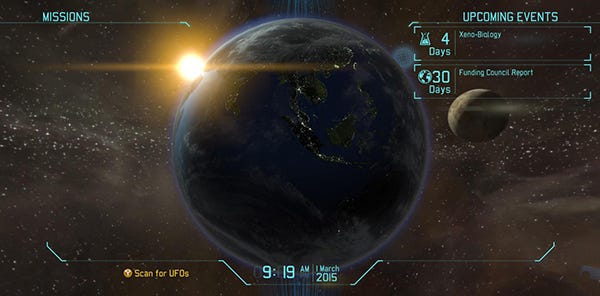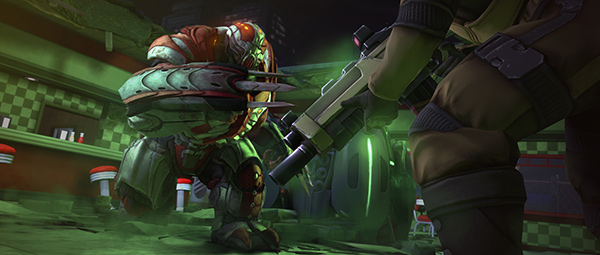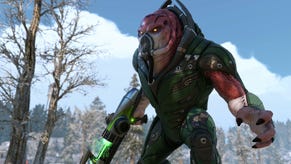Hands On: XCOM - Enemy Unknown Part 2
Baseless assumptions
Yesterday I shared my brief experiences with XCOM’s tactical mode, telling the tale of terrified men and women sent to their untimely deaths as I gleefully discovered that any confidence I had was misplaced. They sure did die a lot. I didn’t die with them though because I’m the commander, sitting in my base and commanding. The scariest thing I have to do in person is deal with the financials and the sinister Council who administer them, that and the occasional moral dilemma.
Thanks to the heavy losses XCOM had already endured under my leadership, I was content in the knowledge that the fight wasn’t going to be easy. I like a challenge and it’d be a half-arsed alien invasion if I was able to see it off with the dregs they were sending up from the academy. Delighted as I might be by the charred corpses being shipped back from the field, my failures weren’t making the Council very happy. They’re a global force of Very Important People Indeed who allocate funding to XCOM, or in my case inform me that funding is being cut in various regions because, let’s be honest, my efforts haven’t been acceptable.
In Firaxis' XCOM, the decisions as to which countries are worth saving is a much more direct one. In the early game it’s a case of abductions being reported in, say, San Francisco and Beijing simultaneously. Who is more deserving of your attention? It’d be deeply unpleasant to have to make that decision based on which skyline you prefer, or whether you’d rather have a plate of Peking Roast Duck than a platter of Hot Tuna, so instead there are direct benefits. Helping out in Beijing might mean you’re gifted a couple of scientists, while the Americans might offer a cash reward.
There are long-term considerations as well. If the North American region is already a little pissy with you, most likely because you’ve screwed up missions in their territory before, then it’s probably sensible to try and bring them back on board. If they decide to stop funding the XCOM Initiative altogether, I’m fairly sure you can’t win them back. That’d be a huge chunk of your money gone and you need money, to pay scientists and engineers, to fund the manufacture of researched materials and to expand your base. Those alien containment units don’t come for free after all.
It’s not just money that powers your base. As you expand from level to level, drilling down into the relative safety of the underground, elevators must be built and, like every other facility, these require power. The biggest power boosts come from building generators on top of the steam vents that naturally occur throughout the base, providing some importance to the actual placement of each facility. I’d be lying if I said I know how complex the base-building becomes as I only managed to build a containment facility and dabble in engineering, but there’s a lot of room for expansion and I’m interested to see what the lower levels could eventually contain.
As for interaction within the base, I was uncomfortable with it at first. It feels very streamlined, with massive heaps of voicework and interaction with the staff of XCOM Solitary HQ Number One. When new research is possible, a scientist will actually ask you to pop by the labs and then talk you through your options. There’s a fantastic discussion about stunning live aliens – the head of research imploring you to send a soldier up close to zap a sectoid and then a military chap butting in and telling her she’s bonkers and imploring you to do no such thing.
Despite the attempt to make the player feel involved, with characters addressing in second person, to camera, I found it all a little alienating for a while, as if I were being instructed rather than informed, guided through a series of narrative beats rather than writing a script of my own. Sometimes I prefer abstraction rather than immersion in my strategy games. Over time though, I realised that the conversations may simply take the place of textual descriptions without stripping away the decision-making. Again, only further playtime will fully convince me of that but even in the short time I had with the game, I saw it open up to my own methods and way of thinking more and more.
The actual voice acting and dialogue is strong and Firaxis are certainly humanising Earth’s defense force. There’s nothing wrong with that and as things become more bleak in the outside world I imagine there will be some tense exchanges. It’s possible, at any time, to pop your head around the doorway of the ominously named Situation Room and look at a map of the world with a ‘doom track’ next to each region, handily informing you how close that area is to being completely overwhelmed. For all the neat atmospherics, I have to say that the shadowy head of The Council, who calls up to debrief after missions, is more than a little overblown, gravelly voiced and barely containing his fury. And he looks and dresses a lot like Agent 47.
Being given a choice of missions, with two things so often inconveniently happening at the same time, is an excellent idea but also made me frown because it’s suggestive of a branching campaign rather than a series of randomised catastrophes. I was asked to rescue an escaped abductee at one point, to prevent the aliens from killing or recapturing her so that we could learn from her experiences. I failed, she was practically vapourised as she ran for the evac zone, and I can’t help but wonder how that affects things going forward. Had I taken an exit from the motorway and was my destination for the next few missions now set?
I don’t know for sure. What I do know is that when my time was up and my team were hollowed out ruins, I wanted to play more. Crucially, despite the fact that this is a game filled with - and perhaps haunted or weighed down by - memories and allusions, it has the potential to surprise. There are new creatures and reimaginings of the old. Seeing the transformation from man to zombie to chrysalid is gruesome and makes a horrible biological sense, at least in a hokey science fiction sort of way. Realising how the thin men might fit into the invasion plan provides space for a grim smile.
I’m almost entirely confident that the use of a single base won’t limit the game in any meaningful way. The need to build satellites to extend coverage across the beautifully ethereal Geoscape means the base isn’t an all-encompassing supercentre. It seems you'll always be informed of certain missions, such as terror events, but without satellites in a region it's impossible to detect and intercept UFOs, either for salvage or to prevent future atrocities. I also reckon that the base is large enough that specialisation is still possible within it.
Tying the player’s physical presence to a single location does allow Firaxis to tell the story of what characters refer to as The Great Invasion from the inside, not just from the battlefields, and it’s shaping up to be a thrilling tale. It’s not just about the single narrative though. I’ll need more time with both the base and the battlefields before I can decide whether this XCOM creates quite as many yarn-spinning opportunities as its magnificent predecessors.
Still want more? Many of the questions I had after my time with the game will be answered in an interview that I’ll be transcribing for your eyes tomorrow, including the not insignificant matter of base invasions.



















